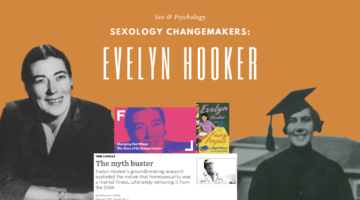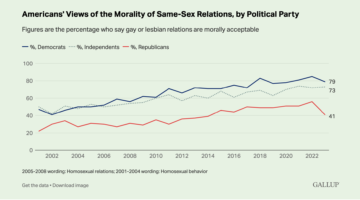The Man Who Said a Vasectomy Made Him Gay
February 22, 2019 by Justin Lehmiller
I spend a lot of time reading scientific journal articles as part of my job and, every now and then, I come across a paper that makes me say “WTF?” Case in point: in doing background research for a blog post about the effects of vasectomies on men’s sex lives a few weeks back, I stumbled onto a paper titled “Homosexual Behavior After Vasectomy.” It turned out to be a case report from 1980 about a man whose sexual orientation reportedly changed after he underwent a vasectomy.
Yep—you read that right. A vasectomy supposedly made him gay.
The patient was a 32-year old man who had been married to a woman for seven years. They had an “active and fulfilling” sex life until the couple mutually agreed that he would get a vasectomy after the birth of their second child. However, “within six weeks of the operation he had experienced, for the first time in his life, homosexual feelings…His sexual interest in his wife declined to negligible levels. His masturbatory fantasies became exclusively homosexual…Three months after the operation he started a homosexual relationship. Homosexual activity occurred daily…One year after vasectomy he continues to live with his wife but remains preoccupied with his homosexual partner.”
So can snipping a guy’s vas deferens really affect who he’s attracted to? Nah. And this is a great example of why you don’t want to draw too many conclusions from case reports.
The most plausible explanation is that this guy was either gay or bisexual (or sexually fluid) to begin with but had not previously acknowledged the truth to himself or to his spouse. The timing of his coming out being so close to his vasectomy was probably more of a coincidence than anything.
Also, when you consider that more than 500,000 vasectomies are performed annually in the United States alone, we’d probably have more than a single case report documenting changes in sexual orientation if that was something that could truly happen following this procedure.
Where does sexual orientation actually come from? Increasingly, research suggests that it has its basis in prenatal and genetic factors, meaning it develops very early in life.
So how did things turn out for the guy in the case report? He found that exploring his sexuality was a “rewarding experience” and he had no desire to change it. If his surgery did anything, it helped him to find self-acceptance.
Want to learn more about Sex and Psychology ? Click here for previous articles or follow the blog on Facebook (facebook.com/psychologyofsex), Twitter (@JustinLehmiller), or Reddit (reddit.com/r/psychologyofsex) to receive updates. You can also follow Dr. Lehmiller on YouTube and Instagram.
Reference: Bass, C., & Rees, D. (1980). Homosexual behaviour after vasectomy. British Medical Journal, 281(6253), 1460.
Image Source: Photo by Stanley Dai on Unsplash
You Might Also Like:

Dr. Justin Lehmiller
Founder & Owner of Sex and PsychologyDr. Justin Lehmiller is a social psychologist and Research Fellow at The Kinsey Institute. He runs the Sex and Psychology blog and podcast and is author of the popular book Tell Me What You Want. Dr. Lehmiller is an award-winning educator, and a prolific researcher who has published more than 50 academic works.
Read full bio >


